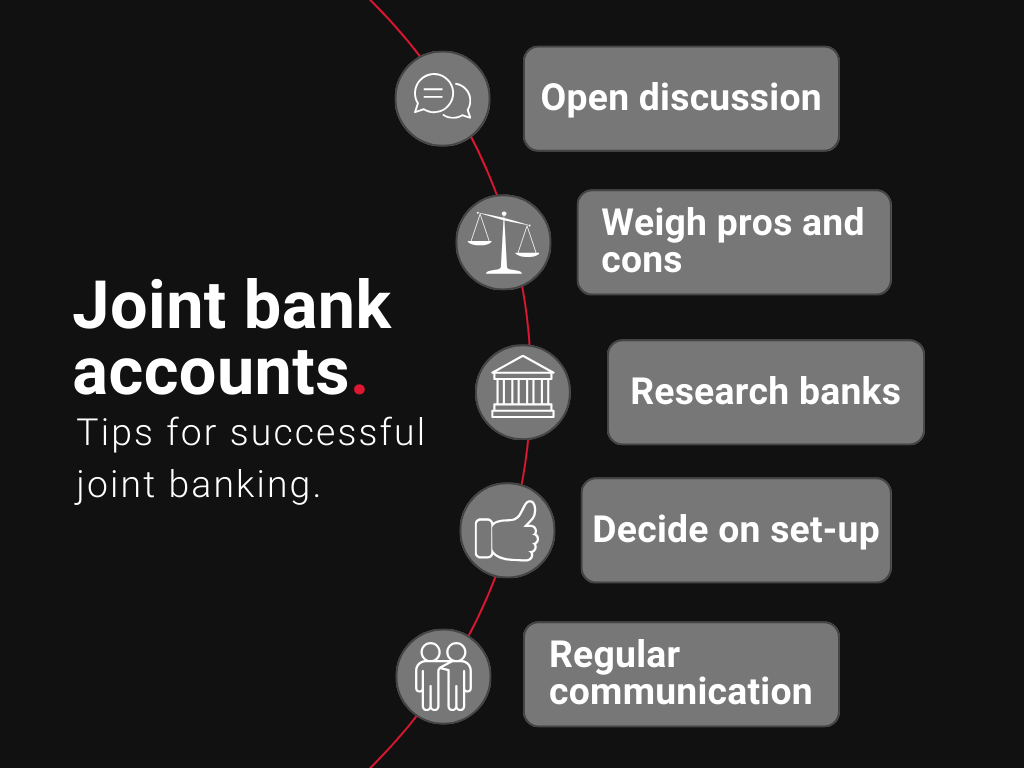When you decide to move in with your partner, many elements of your life feel like they merge. You naturally become more involved in each other’s schedules, decisions and finances. You may even be considering a joint bank account.
But how much involvement is too much? And where should you draw the line?
According to a 2023 study, couples who share their bank accounts are happier and stay together longer than those who don’t.
But that’s not always the case. When you dig deeper, many things can play a part in the success of joint bank accounts.
In this blog, we discuss everything you should consider if you’re looking at setting up a joint bank account with your partner.
Looking to cut to the chase? If you need a solicitor to help you resolve financial dispute, just call us on 0203 007 5500, or submit a contact form.
Why do couples choose to get a joint bank account?
Joint bank accounts come with their uses and pitfalls, and there are many reasons why a couple might choose to get one.
- You may decide to set up a joint account solely to pay household bills, where each person contributes a set amount. Each person would still have their own personal account.
- Some couples may decide to have a joint account as their main account for income and bills.
- If one person isn’t working e.g. for childcare, a joint account could be used so that the non-worker can have access to money.
- You may want to have your partner on a joint account so they can make financial decisions on your behalf when you don’t have the capacity to do so.
- Couples with children may set up a joint account with their child for pocket money and to track their spending e.g. on GoHenry.
- Couples may pool together their savings to get better benefits on some account types.
One or more of these options could work for your household set up.
What are the positives and negatives of having a joint bank account?
Pros
- It’s a more efficient way to deal with household bills.
- You can see all your finances easily.
- Spending and budgets can be tracked in one glance.
- You can work towards savings goals together.
- Having all your finances pre-decided or out in the open may help prevent arguments.
- If one person passes away, the other person named on the account will have access to the funds.
- By sharing money with your partner, you may become more financially savvy due to being more thoughtful about your transactions.
Cons
- Your partner can control the funds without your approval.
- You will both be responsible for paying debt/fees even if it’s incurred by one person.
- If one person is bad with money and one isn’t, it could cause tension.
- One person could drain the account.
- Having a joint account could make you more vulnerable to financial abuse or manipulation by your partner.
- If you have separate accounts and a joint account, it may be harder to keep track of spending.
- It may cause a loss of independence.
- Your credit score could go down if the other person has bad credit.
- It might make it harder to have surprise purchases for example buying an engagement ring.
Who can open a joint bank account?
Joint bank accounts aren’t just for married couples. They are available for friends, unmarried couples, housemates, family members, etc.
The general requirements are:
- You’re living in the UK full-time
- You have identification
- You have proof of address
It’s always best to check with your chosen bank directly.
How to get a joint bank account
Opening a joint bank account is similar to opening any kind of bank account. Many banks allow you to go through the process online, but you can visit your local branch if you’d prefer to.
Who is the legal owner of the account?
Everyone named on the account is equally responsible for the account and the funds within it. This also applies to any debts or overdrafts associated with the account.
What happens to the money in our joint account if one of us passes away?
Usually, if one person from the joint bank account passes away, the other named person on the account will automatically become the owner of the funds. This is through a legal principle known as survivorship.
But as always with the law, this may not always be the case. For example, if one of the account holders specifies something differently in their will.

Tips on opening a joint bank account with your partner
Here are some ideas of things you can do when opening a joint account with your partner:
- Have an initial discussion about your finances and be open about where you’re at with income, debts, repayments, responsibilities etc.
- Weigh up the pros and cons of opening an account together versus having separate accounts.
- Research a bank and choose an account that suits you both.
- Decide on your set-up – this could be pooling all income together or adding set amounts purely for bills. Figure out what works for you.
- Review and change up the situation whilst you adapt.
- Regularly communicate with your partner about your account and general finances.
You’ll probably find that your set-up will change and evolve as you get used to having shared finances.
Be aware of the signs of financial abuse
Having a joint bank account with someone can make you more vulnerable to financial abuse as they will be able to view your spending, move or spend money from the account and reduce your access to funds. They can also create debt that you will be jointly responsible for.
If you think your partner is being financially abusive to you, you should contact the police. There are also other resources available if you need further guidance about spotting the signs.
What are the alternatives?
There are other options that might work for you if you don’t feel comfortable with setting up a joint bank account.
- You may decide to have separate accounts and divide your bills equally between them.
- One person might cover all the bills and then ask for a transfer of the cost.
- You could track all your spending in a spreadsheet or on Tricount and then split the difference.
There are lots of ways to deal with finances in your relationship, so it’s important to discuss and try what works for you personally.
What if things go wrong?
If your relationship breaks down or you decide that joint finances aren’t suitable for you, you’ll need to close your account. You can only close an account if there is no outstanding debt.
Before closing your account, you should redirect standing orders or direct debits.
Depending on your bank, you can close your account online, by phoning customer service or by visiting your local branch. To completely close an account, you will often both have to request it.
If it’s urgent, you can speak to your bank about getting your name removed from the account or freezing the account entirely.
Hopefully from this blog, you’ll have learned more about the good and bad of setting up a joint bank account and can make a better decision about whether a joint bank account is right for you and your partner.











Leave a comment Your email address will not be published.